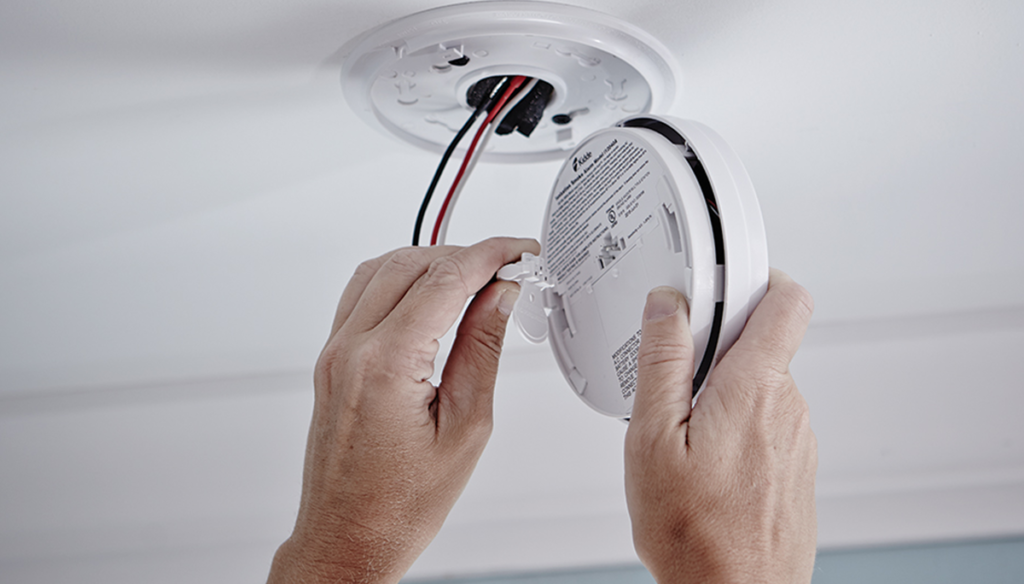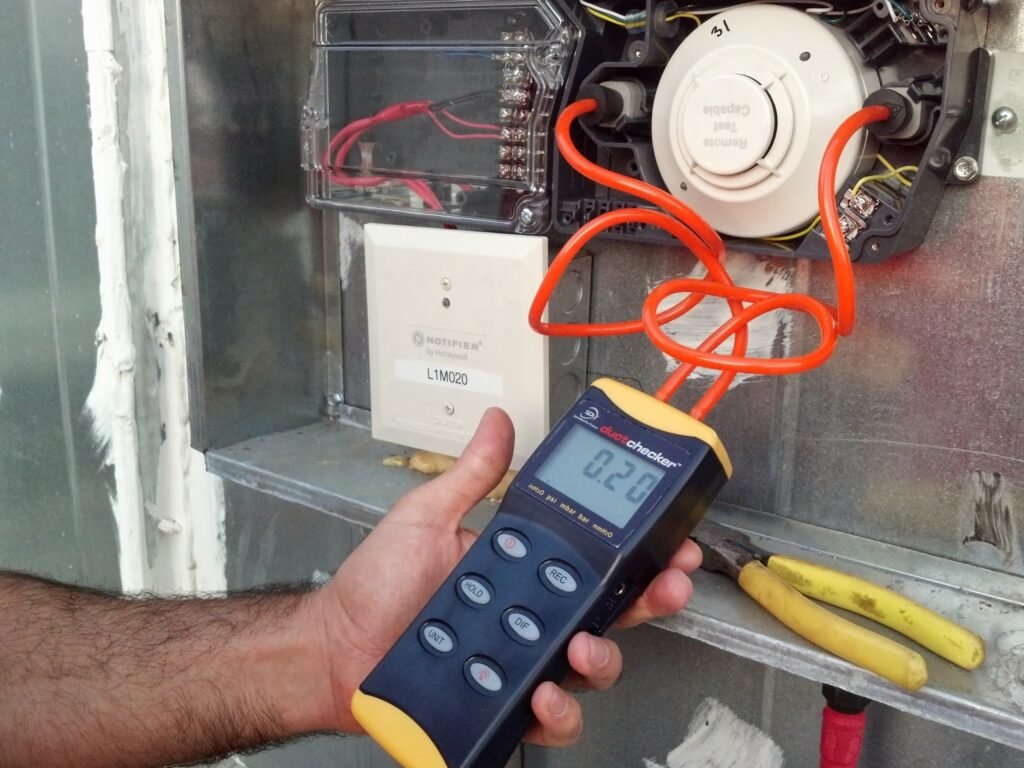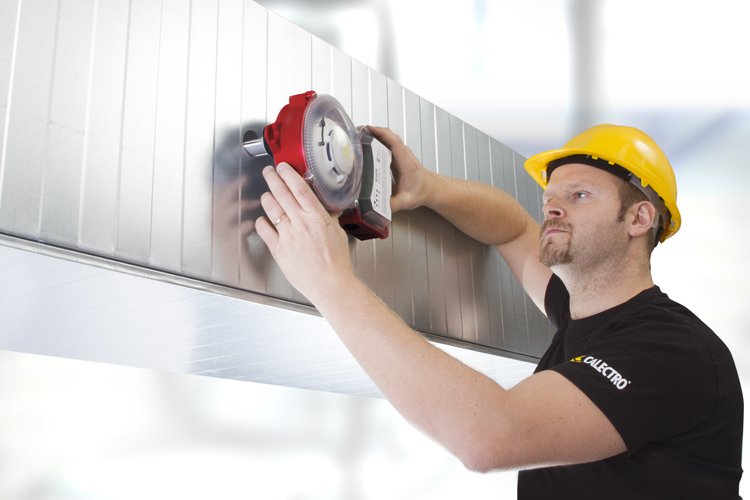Duct smoke detectors are vital components of ventilation systems as they provide smoke or fire detection within HVAC systems, preventing hazards and promising prompt alerts. Similar to all other technological systems, duct smoke detectors are susceptible to operational problems which may disrupt their efficiency. Issues such as false alarms or sensor failures are some of the problems that, when understood, can assist maintain the safety and functionality of your HVAC system and air conditioning systems.
This blog outlines the most prevalent problems with duct smoke detectors, provides their explanations, and suggests measures to fix them. Aside from these issues, we will also cover important factors such as installation of duct smoke detectors, duct inspection, and HVAC system service to ensure your system can be counted on to protect your property.
What is a Duct Smoke Detector?
Duct smoke detector is a crucial safety device located within the ductwork of an HVAC system which detects smoke and or fire. It monitors the smoke particles within the HVAC system’s ductwork and sounds the alarm when smoke or fire is present. Such detectors are equipped with either an ionization or photoelectric detector and are capable of monitoring smoke’s varying air parameters. They are critical in preventing the smoke and fire from spreading through a duct within the building, which is vital in safeguarding the occupants of the building. Duct smoke detectors are often combined with a building’s fire alarm system and are essential for fire prevention and risk mitigation, which is why they are often mandated by safety regulations for more modern buildings with integrated HVAC systems.
Fixing Common Duct Smoke Detector Issues: Easy Troubleshooting Tips
Though smoke detectors placed in ducts are necessary for smoke and fire safety, they are susceptible to some common problems. Such problems can include everything from failing to smoke detection to weak detection. To avert such problems, duct system maintenance, routine inspections, correct positioning of duct smoke detectors, and regular servicing of HVAC systems are critical. Timely action on these issues ensures correct detection and minimal failure, thus protecting the building from fire exposure.
Frequent False Alarms in Duct Smoke Detectors

Perhaps the most prevalent and irritating problem with duct smoke detectors are the frequent and unwarranted alarms. Such alarms signal the need for attention even when the conditions are smoke or fire absent. Humidity or accumulation of dust and debris within the ducts are possible culprits of smoke detectors going haywire devoid of any reason. As described earlier, dust and debris can block the sensors, making the detectors read their environment inaccurately.
Causes:
- Dust buildup or contamination in the ductwork
- Moisture or humidity affecting the sensors
- Installation in high-traffic areas leading to contamination from outdoor elements
How to Fix It:
- Regular Duct Cleaning: To prevent debris accumulation, schedule routine duct system maintenance. Duct Cleaning on a regular basis ensures that dust, dirt, and other contaminants don’t trigger false alarms.
- Proper Installation: Make sure the duct smoke detector installation is done correctly, as placement in areas with high dust or moisture can increase the likelihood of false alarms. A professional installation service can ensure the detectors are placed in optimal locations, away from sources of contamination.
- Use of Filters: Installing air filters in your HVAC system will help trap dust and prevent it from entering the ducts, further reducing the chances of false alarms.
Duct Smoke Detector Malfunction or Failure to Detect Smoke
A duct smoke detector may sometimes fail to detect smoke or fire altogether. This is a critical problem as it compromises the safety of your entire system. Several factors can cause this malfunction, such as sensor degradation, faulty wiring, or a lack of power supply to the unit.
Causes:
- Sensor failure or wear over time
- Wiring issues or loose connections
- Power supply interruptions
How to Fix It:
- Replace or Repair the Sensor: If your duct smoke sensor isn’t working correctly, it may need to be replaced. Over time, sensors can wear out, and it’s important to check their functionality regularly. If you notice any irregularities, replace the sensor with a new, reliable one.
- Check Wiring and Connections: A loose or broken wire can disrupt the signal from the smoke detector. Check the wiring of the duct smoke detector for damage or loose connections. A professional HVAC technician can also help troubleshoot and fix any wiring issues.
- Battery Replacement: In some models, the detectors may rely on a battery backup. Ensure that the batteries are replaced periodically to avoid power failures that may compromise the system’s functionality.
Detector Going Offline or Losing Connectivity

Sometimes, duct smoke detectors may go offline or lose communication with the central system, leading to a lack of smoke detection in the system. This could be due to a malfunction in the detector or issues within the HVAC system’s wiring or communication network.
Causes:
- Loss of power supply or connectivity issues
- Faulty control panel or wiring connections
- Problems with the HVAC system affecting the detector’s operation
How to Fix It:
- Ensure Power Supply: A duct smoke detector can go offline if the HVAC system’s power supply is interrupted. Check the HVAC system for any electrical issues and ensure that the detector is properly connected to the power source.
- Reset the System: Some duct smoke detectors come with the option to reset the system. This may resolve any minor communication issues.
- Inspect the Communication Network: If your HVAC system uses a networked communication system for detectors, ensure that the detectors are properly linked to the control panel. Any communication issues should be addressed by a professional technician.
Inconsistent Smoke Detection Performance
Failure to smoke detection is a persistent problem, and so is intermittent detection alert turning on. The issue is often linked to insufficient and excessive airflow, sensors coming online and off-line, and a myriad of other anomalies concerning the environment within the ductwork.
Causes:
- Poor airflow in the ducts affecting sensor readings
- Blockages in the HVAC system that reduce the detector’s efficiency
- Changes in temperature or humidity affecting sensor performance
How to Fix It:
- Ensure Proper Airflow: Check that the HVAC system is functioning properly and that there is sufficient airflow within the ducts. Poor airflow can reduce the sensitivity of the duct smoke detector, causing inconsistent detection.
- Inspect the Air Conditioning System: Make sure that your air conditioning system is not causing issues within the ducts that may affect the performance of the duct smoke detector.
- Maintain Temperature and Humidity Levels: Significant fluctuations in temperature or humidity within the HVAC system can affect the duct smoke sensor’s ability to detect smoke accurately. Regular duct inspections will help identify if environmental factors are at play.
Outdated or Obsolete Smoke Detectors
Consider upgrading to a more recent model if you’re still using older duct smoke detectors. Outdated models such as these might not function as efficiently as a more recent model, or might in fact lack the sophisticated features that come with newer models. Furthermore, outdated models might not comply with the updated safety regulations.
Causes:
- Use of old or obsolete detectors
- Non-compliance with modern safety standards
How to Fix It:
- Upgrade to Modern Detectors: Consider upgrading to newer duct smoke detectors that meet the latest safety standards. Newer models are designed to provide better reliability and fewer false alarms. They also come with improved sensitivity to smoke and fire detection.
- Stay Compliant: Ensure that the duct smoke detector installation complies with current safety and building codes. Regularly check for upgrades or recalls on older models and replace them as needed.
Sensor Calibration Problems
With the passage of time, the calibration of duct smoke detector sensors may progressively drift, leading to under or over detection of smoke and resultant misfiring. Calibration problems often stem from the passage of time, the user’s environment, or simple fatigue.
Causes:
- Environmental changes like humidity or dust
- Long-term use without recalibration
How to Fix It:
- Recalibrate the Sensor: Many duct smoke sensors can be recalibrated. If you notice issues with detection, refer to the manufacturer’s instructions on how to recalibrate the unit.
- Regular Maintenance Checks: Schedule professional duct inspections to ensure that all components of your HVAC system, including the duct smoke detectors, are properly maintained and calibrated. Regular inspections will help identify and fix sensor calibration issues before they become a serious problem.
Why Choose Airlutions for Installing Duct Smoke Detectors?
Selecting a qualified and professional provider is critical to the safety of your property when it comes to the installation of duct smoke detectors. For installation and maintenance of duct smoke detectors, Airlutions is your trusted partner. A member of our certified team of experts guarantees the installation of detectors to the safety codes and optimal performance, ensuring compliance with safety regulations. From years of HVAC system maintenance and duct inspection Airlutions has learned how to avert problems such as false alarms, sensor malfunctions, and connectivity issues. Here at Airlutions, your duct smoke detectors will be properly maintained with the latest technology and best practices of the industry to assure peak performance at all times.
Conclusion
Like any standard safety mechanism, duct smoke detectors help safeguard your HVAC equipment and mitigate fire hazards, but they can also experience issues such as false alarms, failure, and performance inconsistency. Understanding such problems as Wiring issues, sensor errors, and even airflow complications can help you mitigate these problems. Smoke detection systems and duct systems must be inspected at regular intervals as well as properly maintained. Only then, would the safety systems be reliable and functional, assuring the safety of the home or business.
Airlutions places great emphasis on timely corrective actions and regular maintenance in order to sustain the performance of smoke detectors. With a well trained team, issues related to the HVAC systems are promptly and professionally addressed to ensure they are in, and remain, safe, operational, and efficient. For all your duct smoke detection needs, rest assured that you will receive timely, reliable, and expert service air solutions only from Airlutions.

